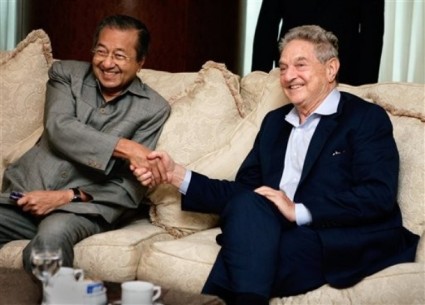Throughout the 1980s and 1990s, at the height of the Mahathir era, during the second Intifada, and often simultaneous with editorials decrying US imperialism, one of Malaysia’s key economic strategies was to invite Foreign Direct Investment (FDI), which reached a peak of 8.8% of total GDP in 1992. Legislation in Malaysia has been deliberately crafted with the aim of attracting FDI, offering companies tax-exempt status, freedom from troublesome labour unions and protection of corporate copyright.
Despite this attention to the needs of foreign investors, the Prime Minister of the time retains iconic status as an anti-imperialist stalwart. Anecdotally, I was told that the name ‘Mahathir’ was the key to the release of three journalists kidnapped in Iraq in 2003. His image is unwavering, despite the adverse impact that the legislation had on (primarily Malay) workers’ rights and incomes, on the freedom of Malaysian companies to enjoy equitable status with foreign companies, and the lack of sustainable economic benefits from the FDI (Kiong, W. & Jomo, K.S.: 2005).
The reason I bring this up here is because of the ongoing argument that organisations such as Bersih and the Centre for Independent Journalism (see disclaimer below) are tainted because they receive foreign, particularly American, funding. The charge is that they are following an imperialist agenda, because they receive money from the United States, and the charge has a foundation. The role of the National Endowment for Democracy (NED) in supporting those who attempted to overthrow Hugo Chavez’s democratically elected socialist government in Venezuela is just one documented example. However, the role of the NED and the US State department’s foreign aid budget in Malaysia has been multi-faceted.
Some figures are perhaps pertinent at this point. In 2007 (a year chosen at random), in the budget line of ‘International Military Education and Training‘, the US government spent $871,000 in Malaysia. Further, the NED has funded training and activities for both the Barisan Nasional and the Pakatan Rakyat through the International Republican Institute, in the same year that it funded Bersih and various NGOs.
I think therefore, it is important, instead of debating whether institutions, networks or NGOs are in receipt of foreign funds, to ask whether those funds are being used in the interest of Malaysians or in the interest of the foreign funder, or perhaps more realistically, will the funds advance the interests of Malaysians as well as those of the foreign funder? To answer this is also to recognise that none of these interests is monolithic – Bersih, for example, is a coalition of groups whose politics do not always coincide (such as the women’s movement and Islamist NGOs).
A second line of enquiry that I think would be both academically and politically interesting would be to examine how the label ‘funding’ operates as a powerful signifier in Malaysian debate: unpack how money becomes labelled as ‘funding’, and what purposes this labelling serves. Is the investment of foreign (state-funded) universities in Malaysia an attempt to subvert the minds of young Malaysians, or a welcome injection of funds into the education sector (or both)?
Lastly, while the Malaysian government, at least under Mahathir ably aided by Rafidah Aziz as Minister for International Trade and Industry, has often spoken critically of US policy on a range of issues from the occupation of Palestine to the patenting of rainforest materials, this has been simultaneous with fostering American investment and military cooperation Within a fortnight of winning the 13th General Election, the Najib administration is moving forward with the Trans-Pacific Partnership Agreement, an agreement which is being negotiated in secret with the cooperation of big business, and which has been broadly criticised for undermining citizens’ rights. Thus, analysis of the actions of political leaders is at least as important as analysis of who funds them.
Disclaimer: The writer is a director for the Centre for Independent Journalism, Malaysia, which has received funding from the National Endowment for Democracy, and other funding agencies, as well as donations in cash and in kind from Malaysians. It has also refused funding from agencies whose political agenda is in conflict with that of CIJ, and if the funding was not in line with CIJ objectives, namely the promotion of media freedom, freedom of expression and freedom of information.
References
Kiong, W. and K. Jomo (2005). “Before the Storm: The Impact of Foreign Capital Inflows on the Malaysian Economy, 1966–1996.” Journal of the Asia Pacific Economy 10(1): 56-69.
 Facebook
Facebook  Twitter
Twitter  Soundcloud
Soundcloud  Youtube
Youtube  Rss
Rss 